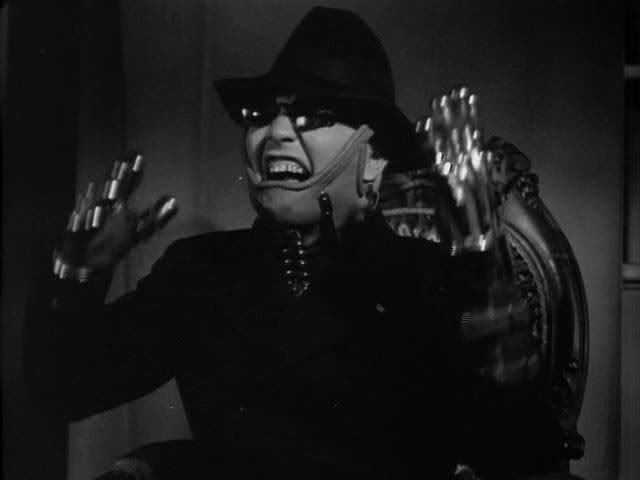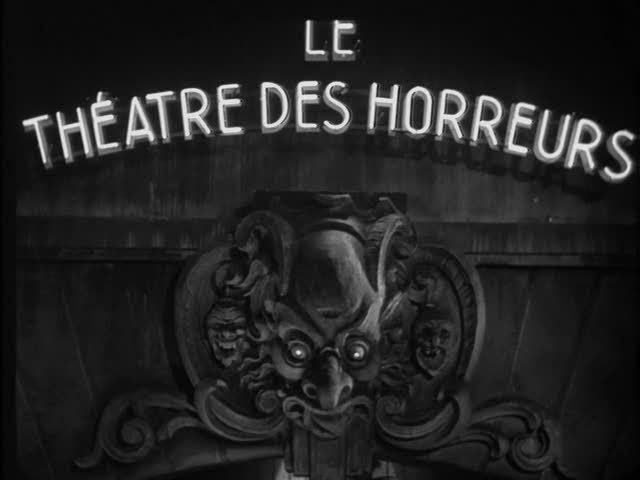
Mad Love is a stunning work of baroque horror, a bizarre masterpiece from expressionist cinematographer-turned-director Karl Freund, Freund's final feature as a director before he retreated behind the camera for good. It's a truly depraved film, populated with a memorable array of eccentrics and grotesques, living up to its title in its exploration of deranged desire and obsession. At its core is an impossible love story, the desire of the kindly but slightly creepy master surgeon Gogol (Peter Lorre) for the beautiful actress Yvonne (Frances Drake), who he watches on stage every evening. Yvonne performs at a horror showcase where her specialty is subjecting herself to elaborate tortures as part of the theater's macabre plays: tales of revenge and betrayal where Yvonne plays women who would rather be tortured than reveal the names of their illicit lovers. Gogol watches her voyeuristically, hidden behind curtains in a balcony where Freund splits the doctor's face in half, half darkly shadowed and half exposed to the light, with one bug eye staring out at the actress' struggles and tribulations. This is a twisted sadomasochistic relationship, with Gogol clearly becoming aroused by Yvonne's struggles in the rack, her increasingly distraught screams — screams that could just as easily be cries of passion as of pain.
And yet, in spite of his nightly enjoyment of Yvonne's mock torture — and his habit of attending guillotine executions with a certain morbid glee — Gogol is outwardly a good man, a dedicated surgeon who refuses payment from his often needy clients, specializing in restoring children and wounded soldiers to full health after dreadful injuries. He is such a decent man that even after the married Yvonne scorns him, telling him that she's leaving the theater to be with her husband Stephen (Colin Clive), he still goes far beyond his duty in an attempt to restore her pianist husband's hands after a train accident crushes them to a pulp. The problem is that in order to perform this miracle, Gogol fits Stephen with the severed hands of the recently executed knife-throwing murderer Rollo (Edward Brophy). These new hands have a life of their own, and as Stephen begins struggling with an incomprehensible urge to handle knives, and even to commit murder, Gogol's obsession for Yvonne begins boiling over. He even cohabits with a wax statue of the actress he adores, buying expensive gowns and lingerie for the waxwork and having his drunken housekeeper (May Beatty) comb the figure's hair.

The film's lurid, psychosexual subtexts are obviously complex, and Freund exploits the story's nightmarish Gothic mood by bathing everything in rich shadows, allowing Lorre's wonderfully nuanced performance to create both sympathy and horror for the mad doctor. Gogol is a sad character in many ways, a man who has mastered science but who finds himself unable to understand why women turn him away, why he cannot earn the love he so desperately desires. The horror of Gogol in the later half of the film, unhinged and laughing madly, even concocting an outrageous disguise to pass himself off as the resurrected corpse of Rollo, is set up by his sensitive, quiet performance in the film's first half.
The film is also bolstered by its great cast of character actors and bit players, who flesh out the film's edges with their eccentricities and humor. As the drunken housekeeper who tends to the waxwork Yvonne and begrudgingly answers the door with a parrot perched on her shoulder, Beatty is particularly hilarious. When the real Yvonne comes to the door of Gogol's house at the climax, the housekeeper, already shaking and suffering from double vision after downing a bottle of cognac, is horrified to find that the statue has escaped, and rushes the girl back upstairs to return her to her spot. Freund also gets some great mileage out of a running gag involving an enterprising reporter (Ted Healy) investigating the mysterious goings-on at Gogol's home. Trying to find out what the doctor has done with the corpse of Rollo, the reporter asks the housekeeper, but she thinks he's talking about the wax figure of Yvonne, with predictably funny misunderstandings resulting. The film is brief, barely over an hour long, but Freund packs a great deal of material into it, shifting ably between tones and styles without making it too jumpy or uneven. Predictably, only the romance between Yvonne and Stephen seems to get short shrift: as usual, the villainy and bizarre sexual and emotional undercurrents of the story are much more interesting than the romance. Otherwise, the film perfectly balances its horror with comedy, tragedy and pathos, creating an enduring B-movie classic.

4 comments:
Great review, Ed...I finally got to see this one last year after reading about it for eons. It totally lived up to expectations, even exceeded them in some cases. Lorre was much better than he was in later years, Colin Clive somehow managed to restrain his natural inclination to overact, and Francis Drake was never lovelier. Ted Healy could have been left out altogether and the picture wouldn't have suffered...in fact, most pictures are better for the absence of Ted Healy. Overall a rewarding viewing experience.
This is a really good movie (and thanks for finally reviewing something I've seen, so that I can leave a comment!), and probably contains Lorre's most representative performance. If that makes any sense. All I mean is that, even though to the general public this film is obscure, the caricature of Lorre that is widely known in cartoons and spoofs in later movies, seems to have been drawn from Mad Love more than, say, The Maltese Falcon.
Kevin: I don't know much about Ted Healy but his character was really funny here. I appreciated the comic relief in this film, it made all the tonal shifts very interesting, the comedy mixing with the macabre. The bits with Healy and Beatty were hilarious.
Bill: Damn, I didn't mean to watch something you'd seen! Oops.... Good point about Lorre's performance. I think it's like he's offering up a caricature of himself already here, amplifying the characteristics that people recognize in his performances generally. So while he's always a little twitchy and creepy and grandiose, here these attributes are exaggerated into the essence of the character. It's really fun to watch.
a very nice tribute to a spectacular film!
according to legend, Lorre's complex portrayal prompted Charlie Chaplin to proclaim him the greatest actor in the cinema--and I can see his point... his Gogol is both extraordinarily nuanced and fantastically over-the-top (as madness tends to be!)...
I second Ed's thumbs up for Healy too--whom I hate in every film except for this one... he's pretty good here as a Lee Tracy type reporter
Post a Comment